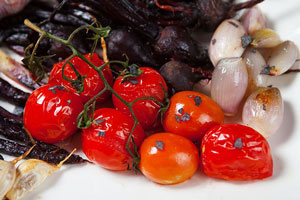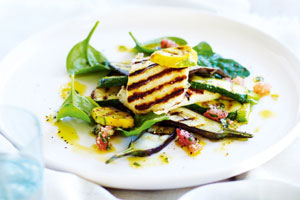Mediterranean Treasures
 Cyprus has a long history of harvesting and trading salt, but much of it used to come from large inland lakes. Lake Larnaca dries up completely in the Summer months and attracts huge flocks of colourful flamingoes in Winter.
Cyprus has a long history of harvesting and trading salt, but much of it used to come from large inland lakes. Lake Larnaca dries up completely in the Summer months and attracts huge flocks of colourful flamingoes in Winter.These days, Cyprus flake salts are harvested from the Mediterranean ocean with a natural evaporation process, which produces the crystalline shape of the flakes. These gourmet salts are produced with the highest standards of purity.
I really enjoy Cyprus flake salts. These Mediterranean treasures have a unique, beautiful architectural pyramid shaped flake. As a (mad) Frank Lloyd Wright fan I see the aesthetic of these pyramids to be the ultimate finishing touch to your dish.
Besides their beautiful form, what about the taste?
They add a fresh taste of the ocean to your food along with a nice, satisfying crunch.

Flake Salts
Cyprus salts are categorized as flake salts. Flake salts are known for their snowflake-like or pyramid-like crystals. Sometimes Cyprus Salts are referred to as Cyprus Pyramid Salts.If you haven’t tried the pyramid flake salts of Cyprus yet, you are in for a taste sensation you won’t soon forget. No need for a salt grinder, they are so delicate they crumble between your fingers. But, the best way to enjoy a flake salts is to let it slowly dissolve on the tongue, or add a satisfying crunch to your dish. They produce a flavor sensation that is distinct, yet light and delicate they are great as a finishing salt for meat and for baked goods.
The salts of Cyprus are sold in two forms: White Cyprus Salt and Black Cyprus Salt, a.k.a Black Lava Cyprus Salt.

Black Cyprus Salt
Black Cyprus Salt is very attractive in salt cellars and an interesting addition to food.
The activated charcoal aids digestion and act helps detoxify the system. Activated charcoal, which is charcoal that is made to be very porous to increase the surface area, is produced by using a certain gas while heating charcoal; this treatment makes the charcoal develop pores which trap toxins, thus acting as a purifying agent.
The charcoal used in Black Cyprus Salt is historically taken from volcanic areas, so the resulting salt is often called Black Lava Salt.
- The stunning ebony colour of this unique salt makes it ideal for use on food immediately before presentation.
- The large ebony flakes look wonderful on foods with great contrast.
- You can even use Black Cyprus Salt to rim drinks for a unique flavour and appearance….let’s say a margarita?
White Cyprus Salt

When you don’t want the exotic colour of black salt, but want great taste and a large-flaked salt,
White Cyprus Salt could be just what you are looking for.
- This delicate flavoured salt is an ideal finishing salt for meats and vegetables.
- It is great on baked goods that need a finishing salt.
You'll find both varieties make a versatile addition to your kitchen and your guests will be enchanted when you present them with culinary creations garnished by these attractive salts.

Recipe idea: Grilled Haloumi and Vegetable Stack
Cypriots used salt extensively for food preservation, such as brined olives, and are famous for their salted halloumi cheese.If you haven't tried halloumi before, do yourself a 'flavour'.
- It's best when grilled or pan-fried until golden, and eaten while still warm.
- Add grilled slices to a simple mezze plate, with some marinated vegetables, roasted cherry tomatoes and prosciutto.
- Or serve this warm salad of Mediterranean grilled vegetables and halloumi. It would make a great BBQ side dish, or even a meal on its own.
Don't forget to sprinkle some Cyprus salt on top!

Recipe image: taste.com.au
